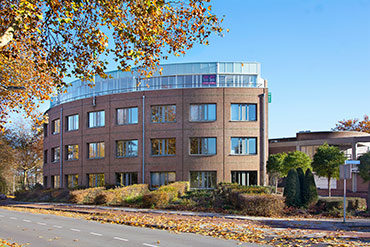Take a walk through your local supermarket and you’ll immediately notice that nowadays the section with vegetarian products is just as extensive as the section with meat and fish! Meat substitutes and vegetarian products are not just popular amongst health fanatics, they are gaining more and more ground. Just from the wide range of meat alternatives that is available today, you can deduce that the sales of these products have increased enormously in recent years. A downside to vegetarian meat alternatives is that they often contain imported soy, shipped in from far away. This makes your veggie burger a lot less sustainable! Is there another solution? Of course! And did you know that you don’t even have to look that far?
‘Water lentil burger’ from our own ditch
One source can simply be found in the ditch (or pond) next to our house: duckweed. This crop consists of 40% protein and that is exactly what we need as a meat substitute. Duckweed grows quickly, but especially under ideal conditions. We all know the examples of ponds and ditches that are suddenly full of duckweed in a few days. The great thing is that we can use the proteins of this weed to make food: the duckweed burger or for fancier reataurants: the water lentil burger. This is a more dignified word for duckweed.
Photo: A well done and a raw duckweed burger
How to grow duckweed?
Duckweed can double in a few days, but you’ll need ideal conditions for that. We grow duckweed at a dairy farmer in the community of Oxe. In the farmer’s yard we’ve built an active biogas installation. The digestate from this installation we can use as food for the production of duckweed.
Our goal is to produce 30 tons of dry matter per hectare. This is about 3 times more than the dry matter that you can produce with grassland. If we look at the protein yield, it is even 8 times more than with grassland. The protein content per tonne is comparable to soy, but with soy cultivation, the yield per hectare is 10 times lower. Therefore, we think the duckweed burger from the Netherlands has the future. Per hectare you can make 250,000 veggie burgers of 200 grams with 20% protein from duckweed.

Duckweed burger, not yet on the shelves
So, we’ve given a solution to make a locally produced veggie burger. The question is, why isn’t this burger already for sale at the supermarket? The answer to this is quite simple. Producing this vegetarian burger isn’t allowed yet in the EU. At the moment, we can only make vegetarian burgers outside the EU. A request has been submitted to the EU and is expected to be honoured. It just doen’t happen very fast. Once approved by the EU, duckweed can be processed in the factory to be used as food for humans.
Building a profitable greenhouse is the challenge
Let’s look at the economy. When duckweed may be used as food for humans, the value is approximately one euro per kg. This gives a yield of 12,000 euros per hectare. The challenge we’re facing now, is to build a greenhouse that is not too expensive, so that a good return remains. And of course the price can rise even further if we compare this with the price of normal hamburgers.
How do we continue this project? This year we are going to build the greenhouse and feed the duckweed to the cows. They like this type of food and it is an ideal replacement for soy. The optimal example of circular agriculture! Only the value then decreases by a factor of 2.5. In this case the business case becomes more difficult. Therefore, we’d like to thank the Province of Overijssel and Interreg Europe for supporting this project to build a demo installation and to carry out further research.
For more information on duckweed, feel free to contact us.
About this article
30 June 2021 / Author: Dr. Ir. René Cornelissen




